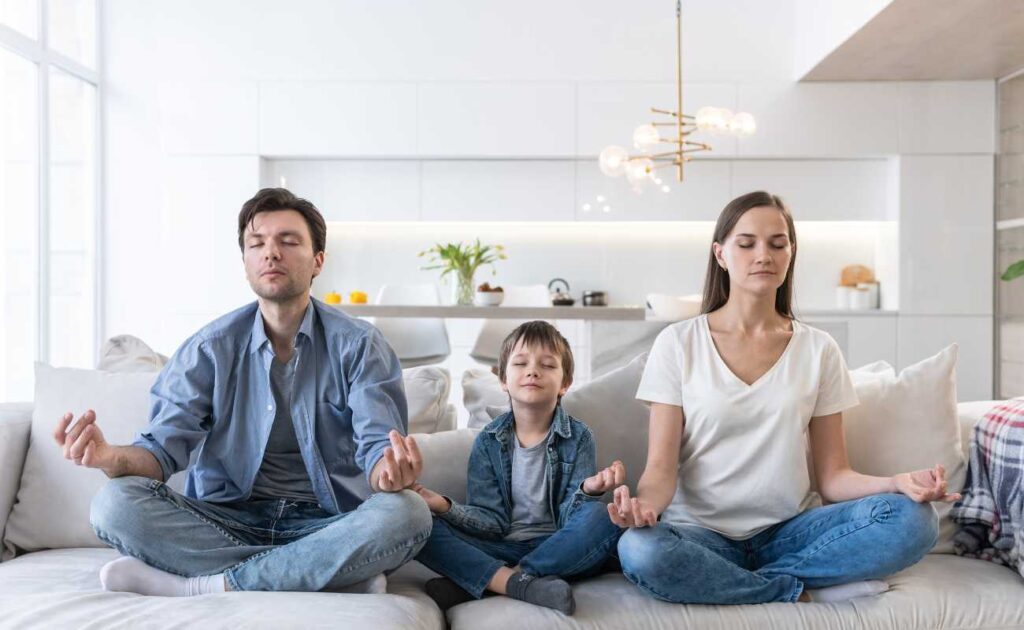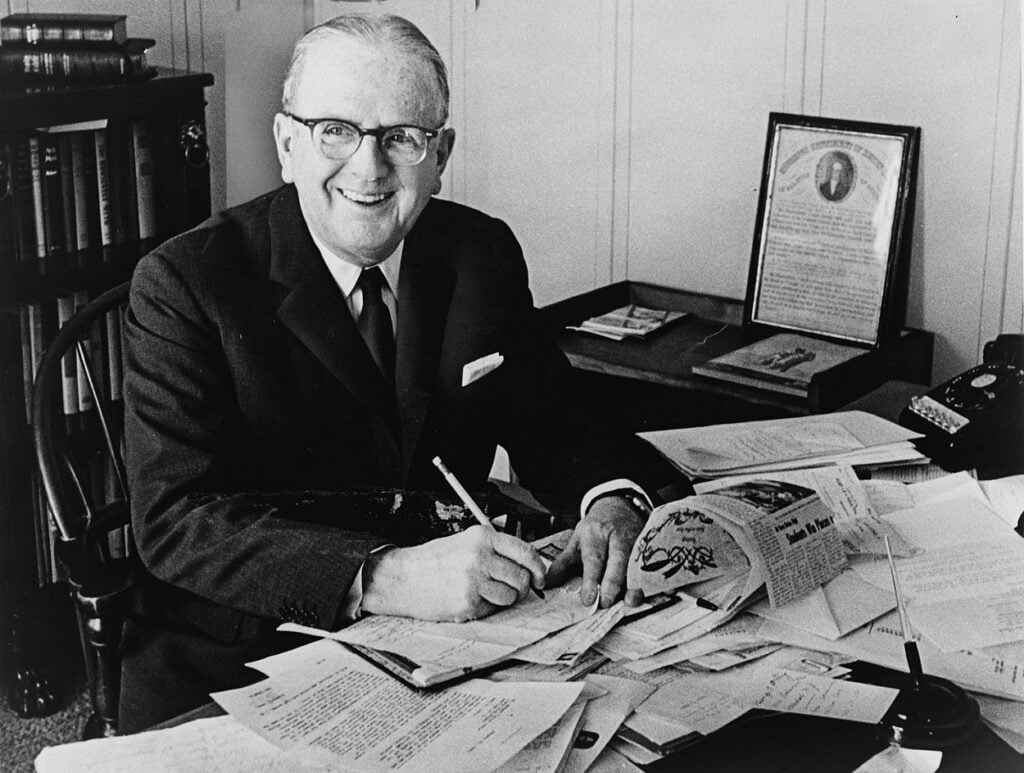Insomnia, this torture of body and mind, seems to have been invented for sensitive souls.”
– Honoré de Balzac
“I can’t sleep, I think too much!”
Many people have difficulty letting go and getting to sleep. Meditation for sleep can be an effective solution for sleeping peacefully and quickly. Indeed, it allows you to let go and disconnect from Stress.
Meditation is an ancient practice of focusing on your breathing and eliminating distracting thoughts. It can be done at any time of the day or evening and does not require any equipment.
There are different meditation techniques. Some are more dynamic, others more static. Meditation can be practiced alone or accompanied. There are many meditation applications that offer sessions of varying length.
👉 Meditation allows you to relax and let go. It helps calm the mind and take a step back from the stressful events of the day. It can be an effective tool for sleeping better.
- “I can’t sleep, I think too much!”
- Meditation for insomnia: quick, effective and natural solution
- What is mindfulness meditation?
- What are the best times of day to meditate?
- What are the effects of meditation on sleep?
- Scientific studies showing the beneficial effects of meditation on insomnia 👨⚕️:
- How to practice meditation for sleep?
- How long do you need to meditate to get restful sleep?
- Is mindfulness meditation dangerous?
- Conclusion: I can't sleep, I think too much! Learn to meditate to let go and sleep peacefully 🙏
Meditation for insomnia: quick, effective and natural solution
“Insomnia is a disease as cruel as it is warlike.”
– Thomas de Quincey
The detailed definition of insomnia:

Insomnia is a sleep disorder characterized by difficulty falling asleep, staying asleep or waking up early in the morning. It leads to a feeling of non-restorative sleep despite a quantity of time spent in bed considered sufficient.
There are three types of insomnia:
- Insomnia falling asleep: Difficulty falling asleep, with a falling asleep time of more than 30 minutes.
- Sustaining insomnia: Frequent awakenings during the night with difficulty falling back to sleep, leading to sleep fragmentation.
- Terminal insomnia: Waking up much too early in the morning, several hours before the desired time to get up.
Insomnia can be temporary (a few days to a few weeks) in response to a stressful event. We speak of chronic insomnia when it has lasted for at least 3 months.
It can have consequences on physical and mental health. Fortunately, there are natural ways to combat insomnia, such as meditation.
Why is it important to sleep well?
It is important to sleep well because it allows the body to rest and regenerate.
Sleep is essential to health and well-being. It allows the body to rest and recover energy to face the day.
👉 Sleep also helps the brain develop and learn.
Also discover: How to succeed in life simply and effectively? 7 steps !
How can meditation help you better let go to sleep?

Meditation can help you sleep better by providing a regular practice of relaxation and concentration. It can also help reduce stress and anxiety, which can contribute to sleep problems. It can be done at any time of the day, but it can be particularly useful before going to bed.
By meditating for a few minutes before sleeping, you can get rid of restless thoughts and concerns that can disrupt sleep. It can help calm the mind and promote deep, restful sleep.
Sleeping peacefully can be difficult for some people. There are many reasons for this, such as stress, anxiety, depression, pain, and other sleep disorders. Meditation can help relieve these symptoms and promote more peaceful sleep.
“I can’t sleep, I think too much”: the surprising power of meditation
Incessant thoughts can be a major obstacle to a good night’s sleep. Negative thoughts and worries can loop through your mind, preventing you from relaxing and falling asleep. Meditation can be a powerful tool for calming your mind and helping you let go of those incessant thoughts.
By practicing meditation regularly, you can learn to observe your thoughts without getting attached to them, which can help reduce anxiety and stress. Meditation can also improve your concentration and overall well-being, which can have positive effects on your sleep. Try spending a few minutes each day meditating to see if it can help you sleep better.
What is mindfulness meditation?

“Sitting your body helps you settle your mind.”
– Shunryu Suzuki
There are several types of meditation. Mindfulness meditation, also called mindfulness, is particularly effective in combating insomnia. This technique involves focusing on your breathing and observing your thoughts without judging them. By being more aware of your thoughts and your body, you can better control them and relax.
Meditation to sleep peacefully generally involves focusing on your breathing. By breathing deeply, we can relax and forget the thoughts that keep us from sleeping.
It is important not to force your breathing, but to let it go at its natural rhythm. We can also focus on a mantra, that is to say a phrase or word repeated several times. The mantra can be Quiet, peace, or any other word that soothes you.
What are the best times of day to meditate?
There is no perfect time to meditate. It all depends on your schedule and what works best for you.
Some people practice meditation in the morning, in order to start the day off right and be more calm and relaxed throughout the day.
Others prefer to meditate in the evening because that is when they are most relaxed and have the fewest distractions.
Some even meditate in the middle of the day, when they have a break, in order to recharge and refocus.
So it all depends on your schedule and what suits you best. The important thing is to find a time when you will be most relaxed and have the fewest distractions.
What are the effects of meditation on sleep?
“Meditation teaches us to calm the mind, to free ourselves from worries and futile worries.”
– Matthieu Ricard
Meditation has many effects on sleep, including beneficial effects on sleep quality and duration. It can help you let go and reduce stress and anxiety, two factors that can contribute to sleep problems.
It can also help calm the mind and make it easier to fall asleep. The effects of meditation on sleep are generally positive, but it’s important to remember that every person is different and meditation may not work the same for everyone.
Scientific studies showing the beneficial effects of meditation on insomnia 👨⚕️:
A 2015 study published in JAMA Internal Medicine followed 49 adults with chronic insomnia for 6 weekly mindfulness meditation sessions. The results showed a significant improvement in sleep quality, including a reduction in the time it took to fall asleep and fewer nighttime awakenings.
A 2019 meta-analysis in Current Sleep Medicine Reports examined 18 randomized controlled studies of meditation for the treatment of insomnia. The researchers concluded that meditation, particularly mindfulness meditation, produced moderate to large effects on insomnia severity and sleep quality.
Another 2011 study in Sleep compared mindfulness meditation to sleep education among older adults with moderate insomnia. After 8 weeks, the meditation group showed better polysomnographic measures of sleep than the education group.
Finally, researchers from the University of California published a study in 2020 in JNCI Cancer Spectrum on 430 cancer survivors with sleep disorders. After a 7-week meditation program, 50% of participants saw clinically significant improvement in their insomnia symptoms.
Most studies agree that meditation, by reducing stress and anxiety, better regulates sleep cycles. Its soothing effect on the mind makes it easier to fall asleep and improves the quality of nighttime rest.
Also discover: I feel bad even though everything is fine! 8 solutions!
How to practice meditation for sleep?
To meditate, simply lie down comfortably in a quiet place and close your eyes. You can focus on your breathing or repeat a mantra (word or phrase) silently. A good meditation should last between 10 and 30 minutes. You can practice it in the evening before going to bed to help you sleep better.
There is no specific position for meditating, but it is important to sit comfortably with your back straight. You can close your eyes or leave them open, and focus your attention on your breathing. It’s normal for thoughts to wander, but just let them go and come back to breathing.
You can meditate alone or in a group. There are many meditation apps and books that can help you get started. You can also take meditation classes.
How long do you need to meditate to get restful sleep?
Some practitioners meditate for hours every day and others practice for only a few minutes. Some practitioners meditate before sleeping and others meditate upon waking up. Some practitioners meditate at different times of the day. I advise you to meditate three times a week for 15 to 30 minutes.
There is no hard and fast rule about how long or how often you should meditate. Meditation is a personal and intuitive process. Everyone must find the pace that suits them best.
Is mindfulness meditation dangerous?
Are there any contraindications to mindfulness meditation?
Meditation has no official contraindications, it is a safe and natural practice for the majority of people. But there are some precautions to take.
People with mental illnesses such as schizophrenia or bipolar disorder should be especially careful when meditating and following a meditation program. Meditation may worsen some symptoms of these conditions and it is important to consult a doctor before beginning a meditation practice.
If you also suffer from severe anxiety or depression, you should talk to your doctor before starting.
Also discover: Toxic People: Signs-Test-Spot-Destabilize-Avoid
Conclusion: I can’t sleep, I think too much! Learn to meditate to let go and sleep peacefully 🙏
Meditation is not a miracle solution for all sleep problems, but it is an effective technique that can help you let go and sleep peacefully.
Meditation can be a great help for those who have trouble sleeping. By focusing on a thought or sensation, we can forget about everyday worries that disrupt sleep. It also allows you to develop better awareness of your body and its feelings, which can help detect signals of fatigue before they become too significant.
Let your mind wander and observe the thoughts that come to you without dwelling on them. If you feel distracted, return to your breathing. Continue to breathe calmly and observe your thoughts until you feel relaxed and ready to sleep.
Meditating before bed can help you sleep more peacefully. Take a few minutes to meditate before bed. You can sit or lie down comfortably. Close your eyes and focus on your breathing. Let your body and mind relax.
Even a few minutes of meditation can help you relax and sleep better.
I have been practicing meditation for years, and I testify that it is very effective if practiced regularly! 🙂
Also discover: How to rediscover the joy of living? 16 tips and quotes




